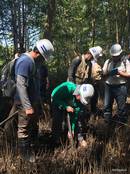Noticias

Since its 2008 inception, the UN-REDD Programme has evolved and shifted its focus to meet the challenges and opportunities of a modern global climate landscape. A growing number of UN-REDD partner countries are now preparing for and implementing REDD+ actions against the backdrop of the Paris Agreement on Climate Change and the 2030 Agenda for Sustainable Development. The Programme has responded to this demand by turning its assistance to help partners align and achieve their climate and forest goals. As its partner countries are making the transition from REDD+ readiness to implementation, the UN-REDD Programme evaluates the progress done so...

By Serena Fortuna, REDD+ forestry officer, U.N. Food and Agriculture Organization (FAO) and UN-REDD Programme “REDD+, forest tenure and the rights of Indigenous peoples” global knowledge component co-leader; Josep Garí, senior policy advisor, U.N. Development Programme (UNDP) Climate and Forests and UN-REDD Programme “REDD+, forest tenure and the rights of Indigenous peoples” global knowledge component co-leader; Elspeth Halverson, global project management and communications specialist, UNDP Climate & Forests; Celina (Kin Yii) Yong, UNDP UN-REDD stakeholder engagement specialist / UN-REDD Programme.
Since its inception in 2008, the UN-REDD Programme (a joint initiative of the U.N. Food and Agriculture Organization, U.N. Development Programme and UN Environment made possible through...

Situated in the heart of Central America and surrounded by high tropical mountains, Honduras has it all – rainforests, cloud forests, mangroves, dry forest and mountain ranges with pine and oak trees. According to FAO’s Global Forest Resources Assessment 2015, forests cover 41% of the country. Dedicated to protecting its diverse forested landscapes from the harsh effects of climate change, Honduras became a pioneer in the development of forest inventories and it stands ready to share its lessons learned with other countries in Central America.
What is the National Forest Inventory?
The National Forest Inventory (NFI) is a systematic collection of data...

Monitoring forest and land cover changes is indispensable for sustainable management of natural resources, biodiversity conservation, ecological protection and developing sustainable livelihoods, particularly for a populated country like Bangladesh. Land cover and forest monitoring activities are part of the Bangladesh Forest Inventory (BFI) carried out by the Bangladesh Forest Department (BFD). The BFI provides information for international reporting and contributes to the achievements of national targets such as Sustainable Development Goal 15 – Life on Land.
With the aim of assessing changes of land cover, forest and other natural resources over time, the BFD with the technical support of Food...

Since its inception in 2008, the UN-REDD Programme has supported inclusive, gender-equitable policy formulation and decision making for national and sub-national REDD+ processes. This approach is based on the recognition that the people who live within or in close proximity to forests, and whose livelihoods depend directly on forests, are best positioned to protect and sustainably manage them. Their perspectives and proposals deserve primary consideration. To underpin this approach, the UN-REDD Programme has integrated representatives from indigenous communities and civil society into its national programmes and processes, ensuring their full and effective participation.
More concretely, the Programme has pioneered rights instruments,...

